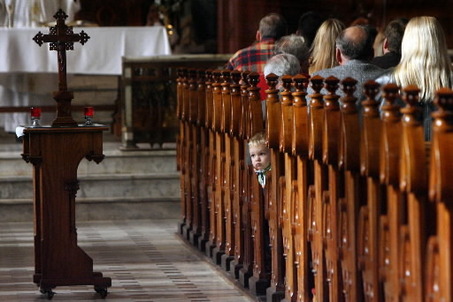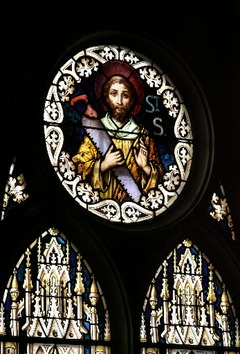By David Briggs
The Plain Dealer
November 8, 2008
http://blog.cleveland.com/lifestyles/2008/11/landmark_churches_minority_eth.html
At St. Wendelin, there is a sense of relief that it may stay open. At St. Malachi, there is a sense of loss over the plan that it merge with St. Patrick.
For all Cleveland Catholic churches, the wait is over after 18 months of struggling with the question of which parishes in their neighborhood should survive a wave of planned church closings.
Over the next week, regional church committees will recommend that at least two dozen city parishes in the Cleveland Catholic Diocese close. Historic landmarks such as St. Stephen, prominent ethnic congregations such as St. Casimir and minority parishes such as Epiphany are among those churches.
The Cleveland parish plans must be submitted to the diocese by Nov. 15.
 |
| Owen Kimbrell, 1, peeks out from a pew during Mass last Sunday at St. Stephen Catholic Church in Cleveland. Owen is the son of Darlene and Ian Kimbrell of Middleburg Heights. The couple were married at the West 54th Street parish, which is recommended for closing as part of a diocesan downsizing plan. |
Bishop Richard Lennon is not expected to make a final decision on closings until March, but some parishes, including St. Jerome and Our Lady of Good Counsel, are lobbying to overturn recommendations that they be shut and merged with other parishes.
"Given the heritage, given the history, given the love for the church, there's no question people want to fight," said Ward 15 Councilman Brian Cummins, who is a member of Our Lady of Good Counsel.
Download list of church closings (PDF)
In May 2007, Lennon ordered a third of 69 regional groups of parishes to come up with plans to close or merge churches in response to suburban flight, growing red ink and a worsening clergy shortage. Clusters in Lorain County and Cuyahoga County suburbs submitted plans in September and October, and plans for Summit County are due in mid-December.
The heaviest burden is falling on the urban churches built in the 19th and early 20th centuries to meet the needs of immigrants. The migration to the suburbs has left them with smaller congregations caring for older buildings with shrinking resources.
No place in Northeast Ohio has been hit harder than Cleveland, where Lennon ordered all 14 regional groups to plan for at least one fewer parish. The committee recommendations would close up to 26 of the 61 parishes in the Cleveland clusters. The city's population is less than half of what it was in the 1950s, with the Catholic population declining from around 287,000 in 1960 to 90,000 today.
Now the 10 largest diocesan parishes are in the suburbs, while nearly half the 63 parishes with fewer than 500 households are in Cleveland.
Lennon said the diocese will do its best to build strong, lasting parishes among the remaining congregations in the city and will continue to provide social services and education opportunities to all city residents. The bishop said he is more concerned about the church's ministry in the city than how many buildings are left standing.
In the pews, however, many parishioners who have attended a particular parish nearly all their lives -- often through baptisms, weddings and funerals -- are mourning the potential loss of their churches.
"It means everything, just as God does," said Ronald Jurcak of his parish, Our Lady of Good Counsel. "It's more than words. It's something within the heart."
 |
| St. Stephen is portrayed on a stained-glass window at St. Stephen Church. The building is on the National Register of Historic Places. Paul Beargie, president of the Society of St. Stephen, says it is a "sacred space" that should be preserved even if it is closed as a parish. |
Cummins said he and others also are concerned about the impact on the West Side of proposals to close St. Barbara and Blessed Sacrament along with merging Corpus Christi and Our Lady of Good Counsel with St. Leo the Great.
"You're really wiping out a church presence to low- to moderate-income households on the West and Southwest Side," he said.
On the East Side, Ward 11 Councilman Michael Polensek is joining with parishioners at St. Jerome and Our Lady of Perpetual Help to protest the proposed merger of the churches. St. Jerome would close, and Our Lady parishioners are concerned the parish to be created on its site would lose its Lithuanian heritage. It is a particular concern because the other Lithuanian parish in the city, St. George, is also recommended for closing.
"These churches are critical to my neighborhood," Polensek said. "How many hits can we take in this neighborhood and still have a viable city?"
Over the next four months, the proposals will be reviewed by diocesan officials and sent on to Lennon. Many churches such as St. Casimir and Our Lady of Good Counsel are trying to make their case to stay open by building up church attendance, writing letters to the bishop and organizing community support. Polensek said parishioners at St. Jerome are considering putting up signs imploring passersby to help them save their church.
At St. Stephen, a national historic landmark on the West Side, some members are trying to save the building even if it means giving it up as a parish.
Paul Beargie, president of the St. Stephen Society, said the acoustics and architecture of St. Stephen make it an excellent site for concerts and special services such as German and Latin Masses and weddings and funerals.
Among minority congregations, predominantly black churches also face substantial losses. Earlier this year, St. Catherine and St. Henry in Cleveland merged with St. Timothy in Garfield Heights to create a parish at the site of St. Timothy. Under the regional committee proposals, the future of churches such as St. Adalbert, in the east central area, and Epiphany and St. Cecilia in the southeast are up in the air.
Until March, Beatrice Wells said, she and others at St. Adalbert will be "praying and praying. We'll be praying and praying very hard every day and every night."
Sister Sheila Tobbe, pastoral associate at St. Cecilia, said the process is painful at her church, like everywhere else in the city.
"But thank God it's painful," Tobbe said. "Because if it wasn't painful, it would say we didn't care about our churches."
Any original material on these pages is copyright © BishopAccountability.org 2004. Reproduce freely with attribution.